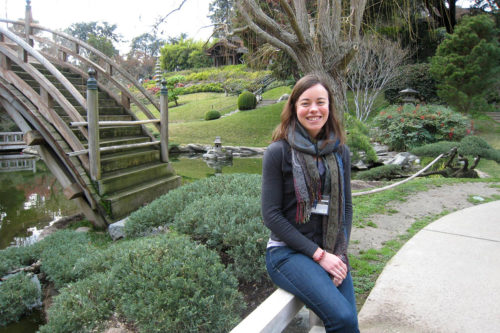One of Central College’s newest faculty members, Valerie Billing is assistant professor of English and teaches courses such as World Literature, British Literature 800–1660 and The Literary Imagination. She completed her bachelor’s degree in English from the University of Illinois and master’s and doctoral degrees from the University of California. Read to learn more about Central’s newest English professor:
What’s your favorite thing about teaching?
I’m always learning while I’m doing it. Sometimes that means historical research to teach an ancient Babylonian creation story or medieval romance, and sometimes it comes from my students, who are always challenging me to think about texts in new ways. Last year, when I was teaching Shakespeare’s “Othello,” a student said that Othello’s tragic trust in Iago reminded her of stories about how her father and his fellow soldiers had to trust each other unfailingly when he was deployed in Afghanistan. That personal connection she brought to the play made me think differently about Othello and about Shakespeare’s soldier characters more generally.
What attracted you to Central College?
I was so excited when I visited Central and saw how many exciting teaching and research projects faculty from different departments were engaged in together. I’m deeply invested in liberal arts teaching, and I feel Central will support me as I grow as a teacher. Lots of other institutions talk the talk of interdisciplinary collaboration, but few faculty actually do it.
What’s something else you are passionate about?
Gardening—one of the very first things I did when I found out I was moving to Pella was reserve a plot in the Pella Community Garden. I’m already growing strawberries, rhubarb and tomatoes, and I just planted an autumn crop of lettuce, spinach, arugula, Asian greens, carrots and radishes. I’ve met many other community members at the garden, so it’s also been a great way of expanding my social circle as a new arrival in town.
What should students know about you?
It’s interesting to know I didn’t start college as an English major—I started out studying human nutrition. My parents gently pushed me toward the sciences because they thought I’d have better career options, but a family emergency during my sophomore year made me reevaluate my future and my priorities, which included changing my major to English. I tell this story to students to show them it might seem like their professors always have been on a clear path, but we’ve changed our minds, made false starts and experienced doubt, and if any of these things happen to them, they shouldn’t take it as a sign of failure.
How did you get interested in your academic field?
I got interested in early modern English literature quite by accident. One semester when I was an undergrad, I signed up for a Shakespeare class and a Renaissance Women Writers class because I needed the requirements and they fit my schedule. I thought reading so much old literature was going to be a nightmare, but I ended up falling in love with it. I was drawn in by how the literature felt both so distant and so familiar simultaneously. The 16th- and 17th-century women writers and many of Shakespeare’s heroines were thinking some of the same thoughts as I was, in the early 21st century, about what it means to be a woman in a male-centered culture. At the same time, the literature included so many details that I found bizarre that I was hooked on learning more about this different culture and the literature it produced.
What is one of your favorite books?
I’m an English professor—it’s so hard to choose a favorite book! I suppose if I were stranded on a desert island and I could only take one book, I’d take my anthology of Shakespeare’s collected works. There’s so much nuance in the wordplay and the form of his plays and poems, and his characters include so much mystery and subtlety. I could never get tired of reading and re-reading them. In terms of more modern literature though, one of my favorites right now is Margaret Atwood’s “MaddAddam” trilogy. It’s set in the not-too-distant future in a world that has been devastated by a worldwide pandemic but also describes the pre-pandemic world’s experiments with gene splicing, obsessions with youth and pleasure, and pursuit of profits over any sort of public good. It’s a brilliant work of literature, and it offers a lot of food for thought for us in our present moment.
What’s the most interesting object in your office?
At the moment, it’s a copy of “The Complete Oxford English Dictionary.” It’s the single-volume edition, meaning that the print is so small you need a magnifying glass to read it. It actually belongs to a friend who bought it for herself as graduation present when she finished medical school in 1999. As a professor of early literatures, I use this dictionary of word histories all the time in both my teaching and research, and having a copy in my office saves me a trip to the library. Sadly, it’s only on a one-year loan from my friend, so if you want to see it, come visit my office this year!
What’s one unexpected thing about yourself?
I really enjoy demolition derbies. One of my favorite things about living in the Midwest is that every summer I have lots of opportunities to watch people crashing cars at small-town county fairs.
At Central College, students are mentored by experts, and not a single class is led by a teaching assistant. Read more news about Central faculty.
